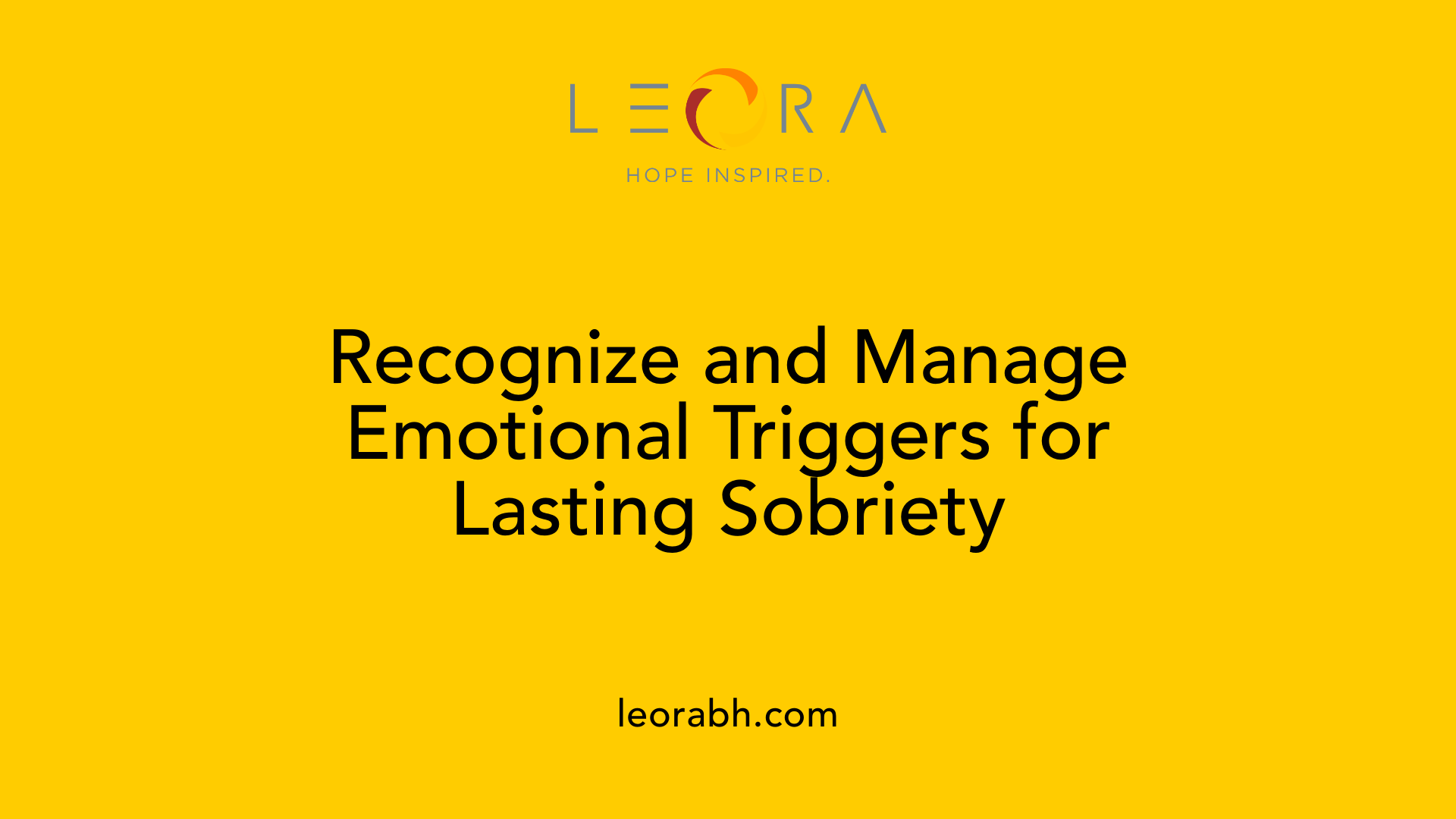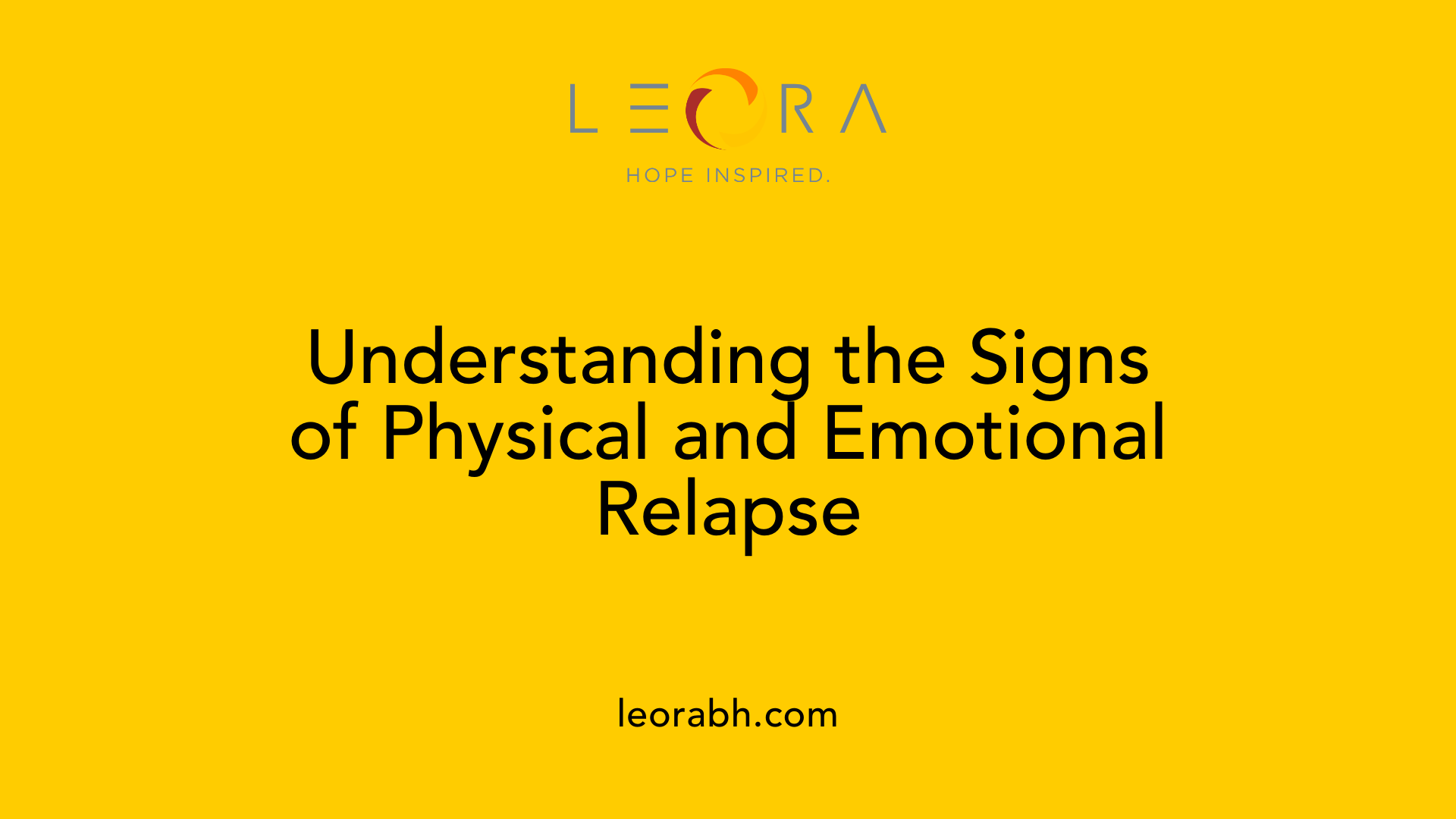Understanding Your Emotional Triggers for Relapse Prevention
Harnessing Emotional Awareness to Sustain Sobriety
Understanding Emotional Triggers and Their Role in Recovery
Addiction recovery is a complex journey that requires more than just abstaining from substances; it involves managing underlying emotional states that can threaten sobriety. Emotional triggers—powerful feelings such as stress, anxiety, loneliness, and anger—play a significant role in the risk of relapse. Recognizing and proactively managing these triggers is essential for long-term success. This article explores the nature of emotional triggers, signs of emotional relapse, effective strategies for self-management, and available resources to support recovery endeavors.
What Are Emotional Triggers in Addiction Recovery?

What are emotional triggers in addiction recovery?
In addiction recovery, emotional triggers refer to strong feelings or emotional states that can set off cravings or increase the likelihood of relapse. These triggers often include negative emotions such as stress, anxiety, loneliness, sadness, boredom, anger, shame, guilt, or grief. When these feelings surface, they can overwhelm an individual, making the temptation to return to substance use more intense.
Triggers can originate from within the person (internal triggers) or stem from external factors like environments, people, or situations linked to past substance use (external triggers). Recognizing these triggers allows individuals to develop strategies to manage them effectively.
Managing emotional triggers is a vital part of sustaining long-term sobriety. Techniques such as mindfulness, journaling, and identifying high-risk situations help increase awareness. Engaging in social support, practicing relaxation methods like meditation or deep breathing, and establishing personalized coping plans enable individuals to navigate emotional distress healthily.
Overall, being aware of emotional triggers and proactively addressing them enhances resilience against relapse, making emotional regulation an essential skill in addiction recovery.
Differences Between Physical and Emotional Relapse

What are the signs of physical relapse?
Physical relapse occurs when an individual resumes substance use after a period of abstinence. Warning signs often include a lapse in self-control, such as consuming alcohol or drugs, often triggered by specific situations or emotional states. Physical cues may also involve a sudden change in behavior, neglecting recovery routines, and increased withdrawal from support networks. Physical relapse can happen quickly once emotional or mental triggers have intensified.
What are the signs of emotional relapse?
Emotional relapse is more subtle and develops gradually. Signs include feelings of depression, anxiety, irritability, mood swings, and withdrawal from social contacts. Behaviors such as neglecting self-care, losing interest in daily activities, and bottling up emotions can also surface. These emotional signs often precede mental and physical relapse, acting as early warning signals that distress is increasing.
How does gradual relapse compare to immediate relapse?
Gradual relapse begins with emotional and mental shifts, giving individuals time to recognize warning signs and intervene. It is characterized by a slow buildup of negative emotions, poor coping, and increased stress. Immediate relapse, on the other hand, can occur suddenly, often triggered by a specific event or high-risk situation, leading directly to substance use without much warning.
Below is a comparison table summarizing these differences:
| Aspect | Physical Relapse | Emotional Relapse | Description | | --- | --- | --- | --- | | Onset | Sudden | Gradual | Physical relapse often occurs rapidly after emotional buildup. | Emotional relapse can simmer unnoticed for weeks or months before physical use. | | Warning Signs | Cravings, actual substance use | Mood swings, withdrawal, irritability | Recognizing these early signs helps in prevention. | | Behavioral Indicators | Using substances, neglecting routines | Isolating, decreased self-care, bottling emotions | Behavioral changes reflect underlying emotional states. | | Prevention Focus | Avoiding high-risk situations, managing cravings | Increasing self-awareness, emotional regulation | Different strategies are needed for each type. | | Recovery Approach | Immediate intervention, support, possible medical treatment | Therapy, coping skills, self-care routines | Tailored actions help in effective relapse prevention.|
Recognizing the Signs of Emotional Relapse
Early warning signs
Recognizing emotional relapse early is vital for preventing a full-blown return to substance use. Signs often include feelings of frustration, irritability, mood swings, anxiety, anger, and a sense of discontentment. These emotional shifts can be subtle at first, but they serve as red flags indicating that emotional well-being is declining.
Behavioral indicators
Behaviorally, individuals may withdraw from social interactions and isolate themselves from friends, family, or support groups. Other warning signs include neglecting self-care routines like regular sleep, proper nutrition, and engaging in activities that promote mental health. People might also become preoccupied with others' issues to avoid facing their own feelings or experiences. Restlessness, impatience, and a tendency to focus excessively on negative thoughts are common behavioral signals of emotional distress.
Importance of early detection
Identifying these signs early allows individuals to implement coping mechanisms such as journaling, meditation, or reaching out to supportive persons. Proactive management of emotional triggers can prevent them from escalating into mental or physical relapse. Addressing emotional distress promptly helps maintain overall sobriety, reinforces resilience, and minimizes the risk of returning to substance use. Timely recognition and intervention are essential steps in sustaining long-term recovery.
Strategies to Manage and Cope with Emotional Triggers
What strategies can help manage emotional triggers to prevent relapse?
Managing emotional triggers is a vital part of sustaining recovery from addiction. Recognizing and understanding your emotional responses—such as anxiety, anger, or boredom—are first steps in maintaining control and preventing relapse.
Developing strong self-awareness allows individuals to notice early signs of emotional distress. Techniques like mindfulness and meditation are effective tools to anchor attention and promote calmness amidst stressful situations. These practices help in reducing impulsive reactions and increasing resilience.
Cognitive restructuring, another valuable approach, involves challenging and changing negative thought patterns that may lead to emotional upheaval. This mental shift can lessen the intensity of emotions like sadness or frustration, making it easier to handle them healthily.
Furthermore, distress tolerance skills—such as deep breathing exercises or grounding techniques—enable individuals to endure difficult feelings without turning to substances.
Building a support system through therapy, peer groups, or supportive friends provides ongoing emotional backing. Regular counseling sessions, for example, can offer personalized strategies and emotional processing assistance.
Creating structured routines helps establish stability, reducing the likelihood of exposure to high-risk situations. Avoiding environments or social settings associated with past substance use is also crucial.
A comprehensive relapse prevention plan, which includes journaling feelings, recognizing warning signs, and seeking professional help when needed, can serve as a personalized roadmap to navigate emotional challenges.
In conclusion, integrating these strategies—self-awareness, mindfulness, emotional regulation techniques, support systems, and structured routines—creates a resilient foundation for managing triggers and maintaining sobriety in long-term recovery.
Handling Cravings and High-Risk Situations Effectively
 Managing cravings and navigating high-risk situations are crucial aspects of sustained recovery from addiction. Various strategies can help individuals prevent relapse by addressing the emotional and physical triggers that provoke substance use.
Managing cravings and navigating high-risk situations are crucial aspects of sustained recovery from addiction. Various strategies can help individuals prevent relapse by addressing the emotional and physical triggers that provoke substance use.
One of the primary approaches is the application of cognitive-behavioral therapy (CBT). This therapy helps individuals recognize and modify thought patterns and behaviors linked to their triggers. By developing new coping skills, they can better manage situations or emotions that might lead to relapse. Motivational interviewing also plays a role by strengthening commitment to recovery and clarifying personal goals.
Mindfulness-based relapse prevention techniques are widely used to help individuals observe cravings without giving in to them. For example, 'urge surfing' involves noticing the sensation of a craving as it rises and falls like a wave, allowing the person to ride out the urge without acting on it. The HALT concept—being alert to feelings of Hunger, Anger, Loneliness, or Tiredness—reminds individuals to address these vulnerabilities proactively.
Pharmacological aids are often integrated into recovery plans, especially for alcohol, nicotine, and opioid dependence. Medications such as naltrexone and acamprosate can diminish the intensity of cravings, making relapse less tempting. In nicotine addiction, bupropion can support smoking cessation by reducing withdrawal symptoms. For opioid recovery, medications like methadone and buprenorphine help stabilize brain chemistry and reduce the desire to use.
Creating personalized relapse prevention strategies is essential. Techniques like the '5 D's'—Delay, Drink water, Distract, Deep breathing, and Decatastrophize—serve as immediate responses to cravings, helping individuals gain control and avoid impulsive actions.
Maintaining a strong support network, whether through peer groups, family, or mental health professionals, provides accountability and emotional resilience. Regular monitoring, including drug testing or self-assessment, can serve as early warnings system, enabling prompt intervention before full relapse occurs.
Incorporating these methods enhances an individual's ability to handle cravings effectively, reinforcing long-term sobriety and resilience against relapse triggers.
Building a Support Network and Utilizing Resources

What resources are available to support emotional trigger awareness?
Managing emotional triggers is a vital part of sustaining recovery. The Substance Abuse and Mental Health Services Administration (SAMHSA) offers a valuable resource: the SAMHSA National Helpline. This free, confidential service operates 24/7 throughout the year, making it accessible whenever support is needed.
The helpline connects individuals with local treatment facilities, support groups, and community-based organizations that specialize in addiction recovery. It provides assistance in both English and Spanish, ensuring broad accessibility.
You can reach the helpline through phone calls, use an online locator to find nearby services, or send a text message via the HELP4U service to get help promptly. This makes it an excellent option for immediate support, whether you need information about treatment options, emotional management strategies, or just someone to listen.
Beyond helplines, building a strong support network is crucial. Engaging with trained professionals such as counselors and therapists provides personalized guidance tailored to individual needs. Support groups—like Alcoholics Anonymous or Narcotics Anonymous—offer peer support and accountability, helping survivors share experiences and coping techniques.
Involving family and trusted friends also creates a safety net, providing emotional reassurance and encouragement during challenging times. Combining these resources forms a comprehensive support system that empowers individuals to address emotional triggers early, reducing the risk of relapse and promoting long-term sobriety.
Which support options are most effective?
The combination of professional help, community support, and accessible resources offers a balanced approach to managing emotional triggers. The key is proactive engagement—seeking help before emotional distress escalates.
Regular counseling, participation in support groups, and continuous use of helplines enable sustained recovery efforts. This integrated approach helps individuals develop coping skills, recognize early warning signs, and strengthen their resilience against emotional relapse.
Conclusion and Final Thoughts: Maintaining Long-Term Sobriety
Maintaining long-term sobriety requires consistent effort and proactive management of recovery strategies. It involves more than initial detox or treatment; ongoing commitment to personal growth and self-awareness is crucial.
Regularly updating your relapse prevention plan helps adapt to life’s changing circumstances. This can include refining coping skills, identifying new triggers, and reinforcing support networks.
Staying engaged with professional help, such as therapists or counselors, ensures that emotional and mental health challenges are addressed early. Participation in support groups provides community, accountability, and shared experiences, which bolster resilience.
Practicing self-care through balanced nutrition, adequate sleep, physical activity, and mindfulness practices like meditation can significantly reduce emotional vulnerabilities and stress.
Building a strong support system is vital. This includes friends, family, mentors, and peer recovery groups—these relationships provide encouragement, accountability, and understanding.
Long-term sobriety also involves ongoing education about addiction and relapse warning signs. The more aware one is, the better equipped to handle potential triggers or setbacks.
Understanding that relapse is often a step in the recovery process, not a failure, encourages persistence. Each setback can be viewed as a learning opportunity rather than defeat.
Ultimately, resilience is developed through continuous self-reflection, goal setting, and embracing new healthy habits. Staying mindful of personal triggers and practicing proactive coping strategies are essential.
By dedicating oneself to these ongoing recovery efforts—such as practicing mindfulness, maintaining a healthy lifestyle, and nurturing support connections—individuals can sustain sobriety and enjoy a fulfilling, substance-free life.
Empowering Your Recovery Journey Through Emotional Awareness
Understanding your emotional triggers, recognizing early warning signs of relapse, and employing effective coping strategies are foundational steps in sustaining long-term recovery. Building a support network, utilizing available resources such as helplines and therapy, and practicing ongoing self-care create resilience against emotional setbacks. Remember, relapse is a common part of the recovery process, offering valuable lessons for growth. With continued commitment, self-awareness, and professional guidance, you can navigate the emotional landscape of recovery successfully and maintain a healthier, substance-free life.
References
- The First Stage of Relapse: Emotional ... - Silver Maple Recovery
- National Helpline for Mental Health, Drug, Alcohol Issues - SAMHSA
- Strategies To Avoid Relapse Triggers - Laurel Ridge Treatment Center
- Understanding Emotional Relapse Signs, Triggers, and Meaning |
- What Are Triggers? And How To Handle Them - Addiction Center
- Staying Vigilant: Recognizing and Avoiding Relapse Triggers
- Coping With Emotional Triggers: Practical Tools for Early Recovery
Find Your Inner Light
Related Articles
Schedule an Assessment
Leora Behavioral Health provides comprehensive treatment services, including ambulatory detox, mental health IOP, and SUD IOP, to support your journey toward lasting recovery.
Our caring team will guide you through the admissions process and create a personalized treatment plan tailored to your unique needs. We welcome walk-ins. If you or a loved one is struggling, reach out today. We’re here to help.


.svg)




.svg)
.svg)
.svg)
.svg)
